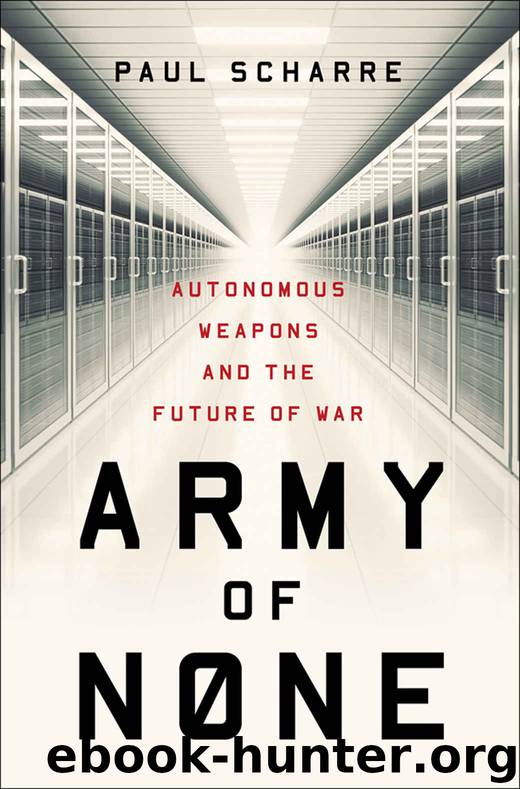Army of None: Autonomous Weapons and the Future of War by Paul Scharre

Author:Paul Scharre [Scharre, Paul]
Language: eng
Format: azw3, epub
Publisher: W. W. Norton & Company
Published: 2018-04-24T04:00:00+00:00
WHO’S AFRAID OF THE BIG, BAD AI?
The fear that AI could one day develop to the point where it threatens humanity isn’t shared by everyone who works on AI. It’s hard to dismiss people like Stephen Hawking, Bill Gates, and Elon Musk out of hand, but that doesn’t mean they’re right. Other tech moguls have pushed back against AI fears. Steve Ballmer, former CEO of Microsoft, has said AI risk “doesn’t concern me.” Jeff Hawkins, inventor of the Palm Pilot, has argued, “There won’t be an intelligence explosion. There is no existential threat.” Facebook CEO Mark Zuckerberg has said that those who “drum up these doomsday scenarios” are being “irresponsible.” David Brumley of Carnegie Mellon, who is on the cutting edge of autonomy in cybersecurity, similarly told me he was “not concerned about self-awareness.” Brumley compared the idea to the fear that a car, if driven enough miles on highways, would spontaneously start driving itself. “In reality, there’s nothing in the technology that would make it self-aware,” he said. “These are still computers. You can still unplug them.”
If the idea of a rogue, runaway superintelligence seems like something ripped from the pages of science fiction, that’s because it is. Those who are worried about superintelligent AI have their reasons, but it’s hard not to wonder if behind those rationalizations is the same subconscious fear of artificial persons that gave rise to tales of Frankenstein’s monster and the Golem. Even the concept of artificial general intelligence—an intelligence that can do general problem solving like us—has more than a whiff of anthropomorphic bias. The concept of an intelligence explosion, while seemingly logical, is also almost too human: First, humanlike AI will be created. Then it will surpass us, ascending to stratospheres of intelligence that we could never conceive of. Like ants, we will be powerless before it.
Actual AI development to date shows a different trajectory. It isn’t simply that AIs today aren’t as smart as people. They are smart in different ways. Their intelligence is narrow, but often exceeds humans in a particular domain. They are narrowly superintelligent. Armstrong observed that the path of AI technology “has been completely contradictory to the early predictions. We’ve now achieved with narrow AI great performance in areas that used to be thought . . . impossible without general intelligence.” General intelligence remains elusive, but the scope of narrowly superintelligent systems we can build is broadening. AIs are moving from chess to go to driving, tasks of increasing complexity and ever-greater factors to consider. In each of these domains, once the AI reaches top human-level ability, it rapidly surpasses it. For years, go computer programs couldn’t hold a candle to the top-ranked human go players. Then, seemingly overnight, AlphaGo dethroned the world’s leading human player. The contest between humans and machines at go was over before it began. In early 2017, poker became the latest game to fall to AI. Poker had long been thought to be an extremely difficult problem for machines because it is an “imperfect information” game where vital information (the other player’s cards) is hidden.
Download
Army of None: Autonomous Weapons and the Future of War by Paul Scharre.epub
This site does not store any files on its server. We only index and link to content provided by other sites. Please contact the content providers to delete copyright contents if any and email us, we'll remove relevant links or contents immediately.
| Automotive | Engineering |
| Transportation |
Whiskies Galore by Ian Buxton(41994)
Introduction to Aircraft Design (Cambridge Aerospace Series) by John P. Fielding(33119)
Small Unmanned Fixed-wing Aircraft Design by Andrew J. Keane Andras Sobester James P. Scanlan & András Sóbester & James P. Scanlan(32789)
Craft Beer for the Homebrewer by Michael Agnew(18237)
Turbulence by E. J. Noyes(8040)
The Complete Stick Figure Physics Tutorials by Allen Sarah(7363)
The Thirst by Nesbo Jo(6932)
Kaplan MCAT General Chemistry Review by Kaplan(6926)
Bad Blood by John Carreyrou(6611)
Modelling of Convective Heat and Mass Transfer in Rotating Flows by Igor V. Shevchuk(6432)
Learning SQL by Alan Beaulieu(6280)
Weapons of Math Destruction by Cathy O'Neil(6264)
Man-made Catastrophes and Risk Information Concealment by Dmitry Chernov & Didier Sornette(6005)
Digital Minimalism by Cal Newport;(5749)
Life 3.0: Being Human in the Age of Artificial Intelligence by Tegmark Max(5547)
iGen by Jean M. Twenge(5408)
Secrets of Antigravity Propulsion: Tesla, UFOs, and Classified Aerospace Technology by Ph.D. Paul A. Laviolette(5365)
Design of Trajectory Optimization Approach for Space Maneuver Vehicle Skip Entry Problems by Runqi Chai & Al Savvaris & Antonios Tsourdos & Senchun Chai(5063)
Pale Blue Dot by Carl Sagan(4996)
